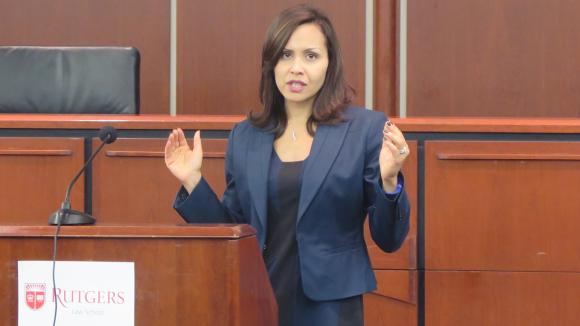
Seton Hall Professor Solangel Maldonado discussed needed reforms to court-ordered punishment for parents who owe child support.
In her talk at Rutgers Law School, titled “Deadbeat Dads: A Feminist Approach” Seton Hall Professor Solangel Maldonado walked the audience through a cycle of poverty and punitive court decisions that had the ultimate effect of separating a father of nine from the children he was supposed to be supporting.
Her remarks were part of a larger project that explores court decisions from a feminist/social justice perspective. The project takes influential court decisions and rewrites them from the perspectives of women and other groups whose interests may not have been fully represented in the actual opinions, Maldonado explained.
Her article, exploring the Supreme Court of Wisconsin’s decision in State v. Oakley (Wis.2001), is part of the U.S. Feminist Judgments Project and will be published in a volume on reproductive justice being edited by Rutgers Law Vice Dean Kimberly Mutcherson. In that article, she writes from the point of view of a state Supreme Court Justice.
In the Wisconsin decision, Maldonado pointed out that the state prohibited the plaintiff, David Oakley, from having more children as a condition of his probation, unless he could show that he could financially support a new child, in addition to his other children, and she questioned whether the state has the right to limit the reproductive rights of parents.
She also pointed out that Oakley had paid 70 percent of the child support he owed for his nine children, but had fallen behind after becoming unemployed and wound up on extended probation, and in danger of being incarcerated, which further limited his ability to catch up on his payments.
The court implied that Oakley hadn’t made an effort to support his children and accused him of being neglectful or abusive as a result, allegations, she said were, “misleading, inaccurate and false.” Though he had been married twice and fathered children during those marriages and was living in a long-term relationship, the court implied he was irresponsible and had never taken care of his children, she said.
“He’s not an individual simply shirking his support responsibilities,” Maldonado pointed out. Because he did not have a high-paying job or a college education that might enable him to get one, he did not make enough money to meet the court-mandated child support costs, even when he was working full-time.
Oakley’s story was emblematic of a bigger problem that disproportionately affects poor and minority parents, who may wind up in jail, or on extended probation because of child support obligations. Maldonado asserted that the court needs to be more creative in the way it thinks about support – and to consider giving credit to parents offering to support their children in ways that aren’t financial, such as providing child care for them while unemployed. In addition, courts could help parents get job skills by mandating job training and education, in addition to parenting classes.
Child support payments are calculated based on someone working full-time, year-round, but may not be based on a parent’s actual income. Even if a parent wants to file for a change in income to have the support payments adjusted, Maldonado said some courts require two years before adjusting the payments.
“We’re not going to remedy child poverty by collecting child support,” she said. She accused lawmakers of demonizing poor parents by limiting public assistance to needy families, implying that poor parents don’t want to work, and by asking parents to pay back public assistance used to support children. She said the policies are part of a larger strategy to end welfare “as we know it.”
Courts have required parents to use long-term birth control, whether or not it is safe for their health, and taken away parents’ abilities to get a driver’s license, tax refunds, some recreational licenses and incarcerated people, Maldonado said. She added that courts should acknowledge the difference between parents who have well-paying jobs but refuse to pay support and those who are struggling financially, many of them with prison records, who have relationships with their children and try to pay what they can afford.
Without reforms in the current child support system – many parents who fall thousands of dollars behind become discouraged they will never catch up – some wind up in jail, which separates them from their children and others simply feel defeated and don’t make any attempt at paying the back support, she added.
Maldonado is the Joseph M. Lynch Professor of Law at Seton Hall Law School. Her research and teaching interests include family law, feminist legal theory, race and the law, and international and comparative family law. She is working on a book that examines how the law shapes romantic preferences and how those preferences perpetuate racial hierarchy and economic and social inequality.
Her talk was sponsored by the Rutgers Center for Gender, Sexuality, Law and Policy. Professor Suzanne Kim, director of the Rutgers Center for Gender, Sexuality, Law and Policy, is also a contributor to the volume on reproductive justice.